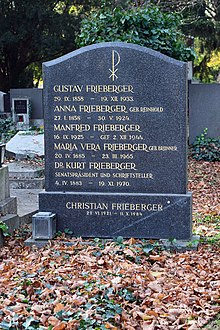Kurt Frieberger
Kurt Frieberger (pseudonym Karl Gustav Ger ; born April 4, 1883 in Vienna ; † November 19, 1970 ibid) was an Austrian playwright and writer.
biography
After completing his law degree, he entered the civil service in 1909. In 1910 he graduated as Dr. jur. From 1918 to 1928 he worked in the First Republic in the Federal Chancellery. In addition to his civil service career, Frieberger devoted himself intensively to conveying culture. B. one of the founding members of the cultural association founded in Vienna in 1922 .
From 1929 to 1938 he served as attaché to the Austrian legation at the royal court in Italy. During the years in Rome, Frieberger ensured a significant intensification of the cultural exchange between Italy and Austria. With the incorporation of Austria into the Third Reich , he lost his post and his pension was declared forfeit. At the same time, he had to accept writing restrictions and was only allowed to publish translations and adaptations. After the collapse of National Socialism , Frieberger returned to the civil service in 1945 and was consequently significantly involved in the establishment of the Ministry for Asset Protection and Economic Planning.
From 1946 to 1953 he was a member of the Administrative Court as President of the Senate. Furthermore, he was active as the cultural representative of the official Austria, repeatedly took part in international conferences, around 1952 when the world copyright agreement was passed in Geneva. In addition to the function of President of the Grillparzer Society, he also held the office of Vice President of the Austrian PEN Club. In 1967 he was appointed professor.
Kurt Frieberger was buried in an honorary grave at the Vienna Central Cemetery (group 109, row 10, no. 10).
Career as an author
The first poems were published in 1907 in the volume of poetry Barocke Monologe . A year later, Frieberger received the Raimund Prize for the comedy The Luck of the Sensible . In addition to other plays such as Hendrijke (1910), the novel Danae (1921), the Sieveringer Sonnets (1919), and the art book The Spanish Riding School (1921) were created. During the time of the Third Reich he edited and translated pieces by August von Kotzebue, e. B. Die Deutschen Kleinstädter or Die Zwei Klingsberg (both 1942), as well as by Carlo Goldoni, z. B. Nightingales from Venice (1943) or A decent girl (1944) and other Italian authors. After the Second World War, a few novels were published, including "Wegbrecher" (1946) Fight with the Hereafter (1949), Montmartre Triumphs (1950) and The Fisherman Simon Petrus (1953), which was translated into English, Spanish, French and Dutch has been translated.
Awards
- 1908: Raimund Prize for the comedy The Happiness of the Sensible (premiered Vienna Raimundtheater 1907)
- 1937: Commander's Cross with the star of the papal New Year's Eve
- 1955: Great Golden Decoration for Services to the Republic of Austria
- 1963: Grand Austrian State Prize for Literature
Works
- Baroque monologues (poems). Axel Juncker, Berlin 1907.
- The happiness of the sensible. A civil comedy in 5 acts; OF Eirich, Vienna.
- Hendrickje. Drama in 4 acts; Premiere Royal Prussian Court Theater zu Cassel 1910, Axel Juncker, Berlin 1908.
- Gloria. Comedy in 3 acts; Premiere of the German Volkstheater in Vienna 1912, Hugo Heller & Cie., Leipzig Vienna.
- Sieveringen sonnets. Wila, Wiener Literarian Anstalt Gesellschaft mbH, Vienna Berlin 1919.
- Baroque ballads. Drawings and the design of the cover by Maria Vera Brunner, print: Christoph Reisser's Sons Vienna V, Wiener Literäre Anstalt Gesellschaft mb H., Vienna Berlin 1919.
Web links
- Literature by and about Kurt Frieberger in the catalog of the German National Library
- Kurt Frieberger in the literature archive of the Austrian National Library
Individual evidence
- ↑ Staff news . In: Der Wiener Tag , April 10, 1937, p. 7 (online at ANNO ).
- ↑ List of all decorations awarded by the Federal President for services to the Republic of Austria from 1952 (PDF; 6.9 MB).
| personal data | |
|---|---|
| SURNAME | Frieberger, Kurt |
| ALTERNATIVE NAMES | Ger, Karl Gustav (pseudonym) |
| BRIEF DESCRIPTION | Austrian civil servant, writer and playwright |
| DATE OF BIRTH | April 4, 1883 |
| PLACE OF BIRTH | Vienna |
| DATE OF DEATH | November 19, 1970 |
| Place of death | Vienna |
